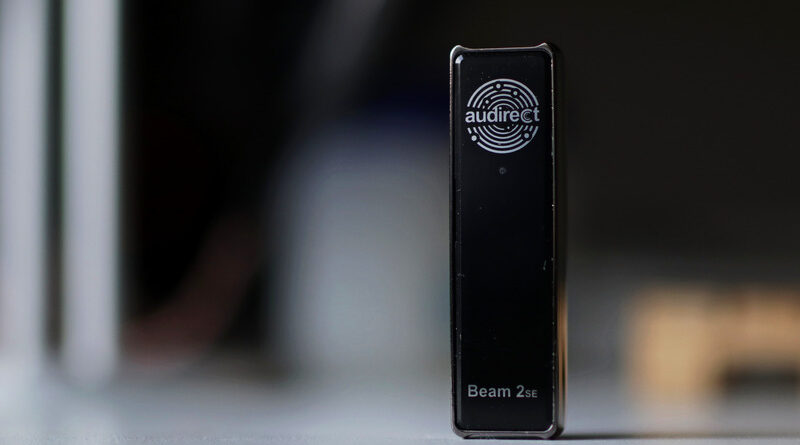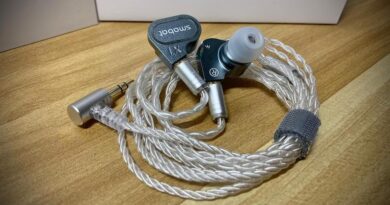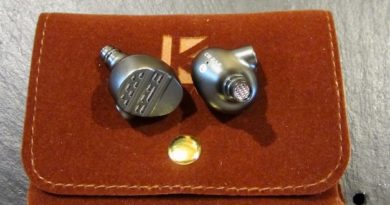Hilidac Audirect Beam 2SE Review – New Contender
Pros — Good Build and accessory pack
– Gain switch is handy
– MQA rendering (for those who need that)
– Great support for iOS/Android/Windows/Linux
– Good sound with above-average dynamism
– Fairly clean background with no noticeable hiss
Cons — Audirect Beam 2SE gets warm during operation
– Could do with a volume button
– Amp isn’t as powerful as other options in the price bracket
– Power consumption is above average
In this Article
INTRODUCTION
The disappearance of the 3.5mm jack from the mobile phones was rapidly followed by the emergence of “DAC/Amp dongles”, and the Audirect Beam 2SE is yet another contender for the DAC/Amp of your choice award under the $100 price bracket.
My first encounter with Audirect was their original HiliDAC Beam which sounded great but was a bit large in size. I missed out on trying the original Beam 2, but fortunately could try out this Beam 2SE which is a slightly cut-down version of the HiliDAC 2S and comes with a single-ended output only. It’s not a bad thing though since in this price-range I don’t see too many dual-mono DAC configurations (thus the balanced out will mostly be not as good as fully balanced setups). There are some who does offer a balanced out but they also have poor single-ended output so buyers are forced to get aftermarket balanced cable.
The competition is stiff, so let’s see how far can the Audirect Beam 2SE stand out from the crowd.
Note: the ratings given will be subjective to the price tier. Nappoler Hu of HiFiGo was kind enough to send me the Audirect Beam 2SE for evaluation.
Earphones/Headphones used: Dunu studio SA6/Dunu Zen, Final E3000, Moondrop Starfield, Koss Porta Pro X, Sennheiser HD650
Price, while reviewed: $90. Can be bought from HiFiGo.
PACKAGING AND ACCESSORIES
The accessories are exactly what one would expect at this price-point: a lightning to USB-C cable, a USB-C to USB-C cable, and a type-C to type-A adapter (for connecting to the PC). The cables are of good quality and seems robust enough to last a while. No complaints.
4.5/5
BUILD QUALITY
Audirect Beam 2SE has a solid build. The side-rails seems to be an aluminium alloy and has a chrome-like finish to it. Two sheets of tempered glass is sandwiched between the rails. Underneath the top glass sheet there is an LED below the Audirect logo that glows in different colors based on audio format/bitrate, e.g. it glows magenta when playing MQA files on Tidal. On the left hand side of the device there is a solitary button which acts as a gain switch (low/medium/high gain) and the LED above the buttons glows in green (low), orange (med), or red (high) depending on gain level. Personally I’d have preferred a volume rocker too which seems to be an oversight.
On the bottom of the device there is the type-C port and that’s about it. Solid, minimalist design that checks most of the boxes (barring volume control).
4.5/5
ERGONOMICS AND PORTABILITY
The Audirect Beam 2SE is very compact and thus it’s easy to carry around while attached to the phone. The weight is higher than the likes of Apple dongle but it’s not a big deal IMO. The big issue with the Beam 2SE, unfortunately, is how hot it gets during operation. It’s not that it’ll leave blisters on your palm but the heat will surely be very uncomfortable in hot summer days. On the flipside, you can use the Beam 2SE as a hand-warmer during winter so perhaps it’s not all bad.
4/5
TECHNICAL SPECS AND COMPATIBILITY
Let’s get the official specs outta the way first:
DAC chip: ES9281C PRO with HyperStream II Quad DAC Technology.
Clock: Two ultra-low femtosecond phase crystal oscillators.
MQA level: Decoding.
PCM Decoding: 32Bit/384kHz.
DSD Decoding: DSD128.
Output Impedance: <1Ω.
Output Power: ≥115mW(16Ω), ≥120mW(32Ω), ≥6.8mW(600Ω).
Frequency response: 20Hz -40kHz (-0.18dB)
THD+N: 0.0003%.
Dynamic Range: 118dB.
SNR: 118dB.
Regarding DAC chip implementation, Audirect seems to have opted for the built-in amp circuit instead of any custom op-amp solution. The Sabre DAC is also an 8-channel one where the output of each 4 channels are combined to reduce noise (thus the Quad-DAC moniker). Suffices to say that these are not exactly “true” quad-DAC, as in there aren’t 4 actual ES9218 Pro chipsets inside. However, the performance gains are measurable indeed and can be seen in the very good SNR and THD+N values (for a product of its class).
In terms of device compatibility, the Audirect Beam 2SE is excellent. It was practically plug and play with every device I’ve tried it on. On the iPhone SE it was recognized right away and could render MQA files right out of the Tidal app (the front LED glows purple). On Android it’s a bit more involved as you’d require something like USB Audio Player Pro (paid app) or Hiby Music (free app) to get bitperfect playback and unlock full volume of the device. On Windows it was again very simple and I could select the Audirect beam 2SE from within the desktop Tidal client and it was rendering MQA files without a fuss. Same applied to Linux (my distro: Pop! OS) though I didn’t try Tidal playback on it (Tidal support on Linux is spotty to say the least).
DAC/AMP PERFORMANCE
Audirect Beam 2SE goes for a fairly analytical presentation. It’s not overly sterile but there is definitely a lack of warmth in the bass and mids. This is not unlike most other ES9218 implementations though Audirect Beam 2SE sounds less sterile than, say, something like the Shanling Q1 or the LG G7. The treble has a hard leading edge which results in somewhat metallic presentation, and I am personally not a fan of this aspect of the Beam 2SE. However, this can be said for nearly every single dongle under $100 barring the Apple dongle (which has its own set of issues) that I’ve tried thus far, so I won’t hold the Beam 2SE too culpable.
In terms of staging/imaging, you don’t get the depth or instrument placement that some higher tier DACs are capable of. For the price range though the staging is a bit wider than average, though depth is just about what you’d expect. Instrument separation wasn’t that impressive either and I suspect dongles with balanced out and dual DACs (in dual-mono config) will do a better job in terms of separation (simply because of size constraints).
What did surprise me (and positively so) was the dynamism on offer. Audirect Beam 2SE has a fairly dynamic presentation for a dongle in its price-class and this is an area where it’s clearly better than many of its peers.
The amp section is above average. It drove nearly all of my IEMs rather well barring Final E5000. The Final E3000, Moondrop Starfield and such warm-sounding IEMs paired really well with the Audirect Beam 2SE. Unfortunately I can’t say the same when it comes to more “neutral” IEMs. Thus, both the Etymotic ER2XR and Final FI-BA-SS sounded more sterile than usual. in terms of high impedance loads, I won’t recommend using anything above 150ohms. E.g. the Sennheiser HD650 sounded poor out of the Beam 2SE with a noticeable lack of bass depth and very lacklustre treble extension. For such headphones and power-hungry planars I’d always recommend a desk setup.
A little note about hiss: the Beam 2SE didn’t hiss with the two sensitive IEMs I’ve got in collection: Final Fi-BA-SS and Dunu Zen when powered from the phones. However when connected to my desktop PC there was some electrical hum which I believe was due to some ground loop between my PC and the Beam 2SE. On my laptop there was less hiss but the playback wasn’t as noise-free as it was on the phones.
In the end, the Audirect Beam 2SE is fairly competitive in terms of sound, and the MQA rendering feature might sway potential buyers. However, I can’t call it outstanding in terms of sonic performance.
4/5
POWER CONSUMPTION
The Audirect Beam 2SE isn’t a frugal device in terms of power consumption. It drains noticeably more power than the Apple dongle esp at high gain. Thus for on-the-go usage I’d recommend not going over medium gain. Unfortunately I can’t provide exact mW figures due to not having a measuring device at hand, but I will get such a device for future tests.
3.5/5
SELECT COMPARISONS
vs Apple dongle ($10): The Apple dongle is the de-facto standard of dongle DAC/Amps, for me at least. It’s cheap, it measures well, and the sound signature is fairly balanced. The big difference between the Apple dongle and the Beam 2SE is the output power with the Beam 2SE being able to get harder to drive IEMs and headphones noticeably louder. Also there is no MQA certification or gain switching on the Apple dongle. It does have a less “glary” sound signature and also is quite forgiving of hiss and such. Moreover, it’s very power-efficient so your phone won’t be as juiced out. In terms of bang-for-buck, it’s hard to beat the Apple dongle, but the build quality is horrible and Beam 2SE will outlast it by a long shot.
vs LG G7 ($250): This is my everyday phone and also kinda portable player. The LG phone has an older gen ESS DAC chip inside but also comes with MQA certification. However, LG doesn’t allow you to switch gain so you’re left with sub-par output levels on <50 ohm impedance loads. In terms of sound, the LG G7 has a more sterile sound. The dynamics are also better on the Beam 2SE, so is stage depth (LG G7 and their other offerings have a very two-dimensional presentation). I could find some merit in buying the Beam 2SE despite having an LG “audiophile” phone if you need a presentation with deeper staging and better dynamics/punch. However, there are some features missing on the dongle that the LG phones provide, namely reconstruction filter selection, some DSP effects, and a half-decent EQ.
vs Audioquest Dragonfly Black ($99): The Dragonfly Black is a product that I’m not a very big fan of. I find it to have middling output power and the presentation has a “fuzziness” to it, as in, the notes sound overly rounded. I think this can be helpful to tame some bright IEMs but often the resolved detail just feel lacking. The staging isn’t also anything to write home about. I think the Beam 2SE is a superior product overall, be it build quality, connectivity, output power, or overall sonic improvement.
vs E1DA PowerDAC V2 ($60): The E1DA PowerDAC V2, despite the mouthful name, is a very capable device. It has gobs of output power (0.5W into 32ohms), has an excellent companion app, and provides a balanced output. However, it gets extremely hot during operation and isn’t really suitable for connecting to a phone. I put this comparison here though in case someone is willing to use the Beam 2SE as a laptop DAC/Amp, and in that case the PowerDAC V2 provides a more powerful, albeit less versatile alternative.
CONCLUSION
The Audirect Beam 2SE provides a solid, if uninspiring performance, and that’s it in a nutshell. It will be an improvement over your phone’s DAC chip in terms of power output and stage depth/dynamics, and it will be competitive among the other options in its own price class. In terms of absolute sound quality it’s not gonna beat the budget desk systems out there. However, given the portability of the device, MQA rendering ability (for those who value it), and above-average output power from the single-ended out I can definitely see it as a viable option in the <$100 price bracket.
4/5
DISCLAIMER
The Beam 2SE was provided by HiFiGo for my review. Thank you very much.
Get the Audirect Beam 2SE from HiFiGo
Our generic standard disclaimer.
PHOTOGRAPHY
You find an INDEX of our most relevant technical articles HERE.










